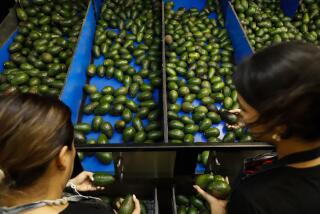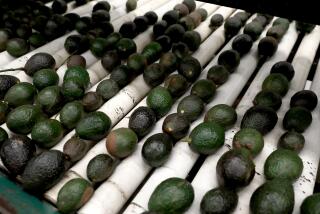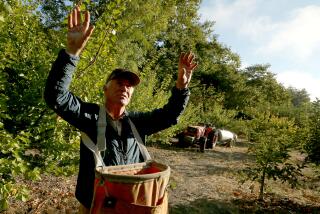WHAT’S FRESH BUYING OPPORTUNITIES : Monster Mash : Avocados of the Bacon variety, which can tolerate frost, are harvested through the chill of February.
- Share via
For many Californians, a salad isn’t a salad without it. And without guacamole, what would happen to the tortilla chip industry?
The avocado, a teardrop-shaped subtropical fruit, is one of Ventura County’s leading cash crops. But more important to the eater, if you are going to eat a food with a high fat content, the avocado is a healthful, no-cholesterol variation. According to the California Avocado Commission, the fruit is low in sodium and teems with potassium and 17 other vitamins and minerals.
Lyle Carson grows about five acres of avocados in Ojai and offers the fruit at his Carson Farm Supply roadside stand. “We are just getting under way selling the Bacon variety,” he said.
Along with the Bacon, Carson said a second variety is grown commercially in Ventura County. The Hass--identified by its thick, pebbly skin that turns dark brown as it ripens--is the most widely grown variety, making up 80% of California-grown avocados.
“The Hass, a Guatemalan variety and the most popular between the two, matures February through October and is grown in the warmer districts because it’s more susceptible to frost,” he said.
Carson said the Bacon variety, with a thin, smooth skin, will be in production now through February and is grown in the cooler regions of Ventura County, given its tolerance to frost.
“It is a Mexican variety that tends to be more watery than the Hass,” he said. “And it does not command the market price that Hass do.”
Carson referred to the Hass as a “heavier, meatier variety with a somewhat nutty flavor,” while the Bacon is lighter and “just doesn’t have as much oil as the Hass.”
“The Bacon, however, is a more consistent bearer,” he said. “You don’t have the production fluctuation like the Hass.”
Harvest yields of the Hass avocado tend to alternate from year to year, Carson said. “You will have a big crop one season and the following year production falls off.”
As much as a 40% difference can be expected. “It’s just the nature of the beast,” he said.
At harvest time, the fruit is picked by hand when it has reached a mature, but not fully ripened state.
“The fruit must soften off the tree,” Carson said. “It’s picked when the oil content reaches a certain degree.” He said the minimum oil content of harvested avocados must fulfill strict California Department of Agriculture demands that are implemented to protect the consumer from buying undesirable fruit.
“The minimum oil content guarantees that the fruit will ripen and will be edible,” he said. “If picked too soon--and the oil content is too low--the avocado would just shrivel up and not ripen.”
A grower must also judge harvest-readiness relative to the time the avocado will spend waiting to be purchased.
“Fruit left too long on the tree will have a high oil content, thereby shortening the shelf life because it reaches ripeness too quickly,” Carson said. “And an avocado with a high oil content can soon become rancid.”
After purchasing avocados that haven’t reached desired ripeness, consumers can control the rate at which the fruit ripens, Carson said.
“You can vary according to your needs,” Carson said. “Buy three. Put one in the fridge, one in a brown bag and the other on the counter.
“The one in the fridge will ripen slowly. An avocado left in a bag will be exposed to its own ethylene gas, which speeds up ripening” and, left on the counter, an avocado will ripen at an average pace, he said.
Carson said last year’s avocado harvest was generally small due to unfavorable weather conditions. Specifically, a heat wave during April--the bloom period-- sterilized the pollen. To make matters worse, a frost hit in February. Prices soared.
“However, consumers can expect lower prices this harvest season because the crops are looking good,” he said. “We’ll see an increase in total poundage over last year.”
Carson said he will be selling Bacon avocados for 75 cents each.
Carson Farm Supply is at 111 Topa Topa St., Ojai, and is open 9 a.m. to 5 p.m. Mondays through Saturdays. Call 646-3617.
More to Read
Eat your way across L.A.
Get our weekly Tasting Notes newsletter for reviews, news and more.
You may occasionally receive promotional content from the Los Angeles Times.










